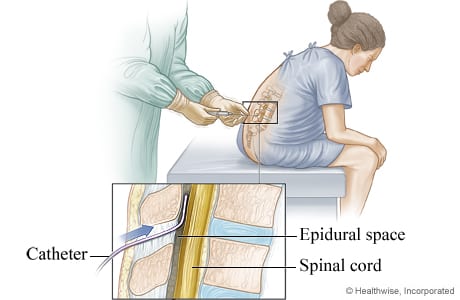When a woman finds out she is pregnant, one of the big decisions she will have to make for her birth is whether or not she will receive medication for pain relief. There are many types of pain relief medication one can choose from; the two categories are analgesics and anesthetics. The most common pain relief used for childbirth in the United States is an epidural, an anesthetic. With this procedure being so common, it is surprising how many women experienced things they never heard of or expected.1 We asked our Facebook group what they wish they had known before getting an epidural, and after receiving over 200 comments, we wanted to share their thoughts with you.
What Women Wish They Knew Before Getting an Epidural
1. “I wish I knew that you have to have a full bag of fluids before you can get an epidural.”
Some people may think that you can receive an epidural anytime you want, whenever you are ready. But if you haven’t been in the hospital for long, you will have to receive an entire IV bag of fluid before you can get an epidural. So if you know that you want an epidural for your labor, know that you will have to take the time to receive fluids, then wait for the anesthesiologist to be ready before getting your epidural. There may also be a few patients ahead of you, and if so, you’ll have to wait in line, too.
2. “I wish I knew that they’d make my baby’s dad wait outside while they put in the epidural.”
Most hospitals require all support people (e.g. doulas), partners included, to wait outside the labor and delivery room or in the waiting room until the epidural procedure is complete. Many people get uncomfortable and have even fainted watching a medical procedure like this. This is why it is a standard procedure for all non-medical people to leave the room.
3. “I wish I knew that I had to sit up for the procedure, which was excruciating.”
Some people have received an epidural while lying on their side, but most are required to sit up during the procedure. Your anesthesiologist will need you to sit up on the bed with your feet hanging down the opposite side of where the anesthesiologist is sitting. You will be hunching over (grab the pillow to hug as you do this), as the doctor will need you to curve your back. You will also need to remain as still as possible as they place the epidural catheter in your back.
4. “I wish I had known how still you have to be when getting the epidural placed in your back even if your contractions are double peaking.”
Your anesthesiologist needs to place the epidural in the appropriate space in your back. They will try to do it between contractions, but you still need to remain very still if you get a contraction while the procedure is happening. They will not stop mid-procedure.

5. “I wish I had known that I had to wait 20 mins for it to kick in.”
Once your doctor has placed your epidural, they connect it to a medicine pump machine that will continuously drip the epidural antibiotics into your back. It can take about 20 minutes for you to feel good relief.
8. “I wish I had known you wouldn’t be allowed to get up afterward.”
After receiving an epidural, you will not be allowed to get out of bed. The only positions that your doctor will let you be in are lying on your right and left side, lying on your back, or sitting up. One mother said, “They wouldn’t let me move around after. I think it ultimately caused me to end up with a C-section. . . I wasn’t progressing on my back.” This is why I recommend women switch from laying on their right to their left side, then sitting up and changing those positions every hour. Staying in the same position can potentially stall things.
7. “I wish I had known that I was going to get a catheter.”
Since you can’t get up out of bed, this includes not getting up to use the restroom. You will also be numb from the waist down and unable to feel when you need to urinate. Thankfully, your nurse will wait until your epidural has kicked in before putting in your catheter so that you won’t feel a thing.
One mom mentioned, “because there is a catheter involved, when they take the catheter out (which you don’t feel—just like you don’t feel it going in either), you have to be able to pee on your own within a certain time. If you don’t, they’ll have to put it back in again, and this time you wouldn’t be numb. I’ve never concentrated so hard on peeing in my life!”
8. “I wish I had known that I wouldn’t be allowed to eat anything once I got it!”
“I was starving, and clear liquids weren’t cutting it,” one mom stated. In case of an emergency C-section, some doctors prefer laboring women to be on an all-liquid diet or only ice chips once they have gotten an epidural. Some doctors even make this demand once you’ve checked into the hospital, whether you choose to get an epidural or not.
9. “I wish I knew that my blood pressure would drop, causing me to pass out.”
Several side effects can happen after receiving an epidural, and one of them is your blood pressure dropping. When your blood pressure drops, it can cause women to pass out. This is one of the reasons you’re given fluids before administration to keep your blood pressure up. One mom said, “My blood pressure did drop dangerously low. I had to get a magnesium drip to avoid having a seizure.” This is why you will have to continuously wear a blood pressure cuff once your epidural is in place, and your nurse will check your blood pressure every 15-20 minutes to make sure that it remains normal.
10. “I wish I knew that it would make me throw up, get the sweats, and almost pass out.”
Another mom shared that she almost passed out, had the sweats, and caused her to throw up. These are other side effects that can happen. And another mama said, “It would make me throw up, and the force of throwing up dilated me to 10 centimeters within 20 min of getting it!” All of that pressure of throwing up can put more pressure on your cervix, causing it to dilate, which is a great thing!
11. “I wish I had known my entire body would be extremely itchy.”
Itching is a common side effect of the opioids used in an epidural. The woman’s face, chest, bottom, and pretty much anywhere can begin to itch. This itching reaction from the medication can last even a few hours after the medication wears off. Fortunately, they can treat the itching with another medication. Other less common side effects of opioids include nausea, vomiting, and breathing problems.
12. “I wish I had known that it’s possible to get a fever with it.”
Some women will experience getting a fever from an epidural after giving birth, though the cause is unknown and may be due to factors other than the epidural. For example, a mom shared with us, “I had to stay in the hospital for a mandatory 48-hours so they could monitor my fever, instead of the normal 24-hours. A whole extra day in the hospital is a lot.”
13. “I wish I had known about the shivers.”
The shakes or the shivers are another common side effect of epidurals. Your body can spontaneously begin shaking shortly after the epidural is administered. One mom said, “The shivers afterward were uncontrollable and horrendous. It took five warm blankets to get them to calm down.” The shakes happen because the epidural medication is colder than your body temperature. It’s purely a physical reaction to the local medications and is not necessarily a reflection of feeling cold. It’s also believed that shivering is due to hormonal changes in the body.2
14. “I wish I had known that you could ask for more or less.”
If you are still feeling pain and it’s been more than 30 minutes, you can ask for the anesthesiologist to come back and give you more medication. And some epidurals will administer too much medicine, resulting in not being able to move your legs at all. A mom from our group said, “They gave me too much in my epidural, and I wasn’t able to feel myself pushing at all. It ended in a C-section after 3 hours of unsuccessful pushing.” If you’re completely numb and unable to feel or move your legs, you can ask for your epidural to be turned down or off (don’t worry—you won’t go back to feeling everything right away!) before pushing.
15. “I wish I had known that everyone doesn’t completely lose feeling.”
“I was so against an epidural because I wanted to be in control of my birth experience. The hospital told me it would be best to get it after my labor had been going on for so long, so I waited. Once I got it, I was still very in control and did not lose total feeling at all.” As this mom said, some women are afraid of losing complete feeling. If you talk to your anesthesiologist about this, they can hopefully give you the correct dose to remove the pain, but it still allows you to move your legs on your own in bed.
16. “I wish I had known not to let the resident do it!”
A mom shared, “It took the resident five times to get the epidural right. Had I known, I would have insisted on the attending doctor. It’s not something to mess around with. Still, it was the best decision I made to get it, and I had no pain!”
Another mom said, “The on-call anesthesiologist was terrible at them . . . She had to try six different times, six separate needles, and she didn’t communicate at all with me, so I wasn’t expecting it and flinched. Because of this, I had really bad spinal fluid leakage. I told them to stop and that I didn’t want it, but it was turning into an emergency, and they wouldn’t let my husband back in the room for it.”
17. “I wish I knew that it doesn’t always work for everyone.”
Some women have reported that no matter what the anesthesiologist did or tried, the epidural did not work. They still felt the pain of the contractions and their baby’s delivery. If you have scoliosis or any back issues, you might be able to try to get an epidural, but it might not work. One mama said, “It wouldn’t work because of my backbone shape.”
18. “I wish I knew that if you still feel the pain ask them to check it for you.”
“I was in pain for hours after having mine only to find out they kinked the line, and I never received any of the medicine,” one mom shared. Speak up if you are not feeling relief after 20-30 minutes.
19. “I wish I had known that it doesn’t always distribute properly!”
Sometimes women will experience the medication only numbing one side of their body. For example, one mom said, “With my 2nd delivery, all of the epidural medication was going to the right side of my body and NONE to the left.” This can happen. The medical staff will typically recommend you lie on the opposite side so that the epidural medication can try to disperse to the non-numbed part of your body. If that is not working, the anesthesiologist can come back and redo your epidural.
Another mom shared, “With my first two epidurals, everything was fine. They worked perfectly. With my last one, it only worked on half of my body, my blood pressure plummeted, and I had to get three doses of epinephrine to raise it. My bladder was numbed so much that I couldn’t tell if I had to pee or not for 2 days (the catheter had to stay in), and the spinal headache I had for two weeks after. It was the WORST headache I’ve ever had. I thought I had an aneurysm.”
20. “I wish that I had known that the epidural can wear off.”
Epidural medication runs through a tiny catheter inserted into your lower back and continuously drips that medication. However, the medication can stop and wear off if you have been in labor for too long and your pump is empty. Several moms in our group said this happened to them. One shared, “My epidural ran out during my long labor. My nurse wasn’t paying attention.” Another mom said, “My epidural wore off, and I ended up feeling everything anyways.”
21. “I wish I had known that not everyone can get one.”
There are some instances when women can’t receive an epidural. For example, you can’t have one if your blood work isn’t right (i.e., you have a low platelet count) or have an infection of the back, and some women aren’t able to get one if they have scoliosis other back issues.3
22. “I wish I had known not to move too much with it in my back!”
Usually, the anesthesiologist tapes the catheter securely to your back, but mistakes can happen. “Mine slipped out twice mid contractions going back to back! Worst pain ever, and it happened overnight when the anesthesiologist was in surgery,” said one mom.
23. “I wish I had known to get it sooner.”
Most moms have great experiences with epidurals, and we had a few say, “It was the best thing ever!” One mom said, “I didn’t have any issues!! It was the best thing ever!!”
24. “I wish I had known that having an epidural would be a good thing in case of an emergency C-section.”
“I didn’t want an epidural at all . . . but I decided at the last minute to get one as labor was making me puke, and I’m so glad that I got it because I ended up having an emergency C-section. They were then able to change the meds, and I was able to stay awake the whole time during surgery.” An epidural provides easy access in case of an emergency surgical birth. But if an emergency C-section is necessary and you don’t have an epidural, you may receive a spinal block. This is a shot done in your lower back that can keep you awake during your baby’s birth but numb your lower body and extremities. Some situations are too emergent, and general anesthesia is necessary.
25. “I wish I knew that it could make your labor so much longer.”
Some women have reported their contractions slowing down after receiving an epidural, which then causes them to need Pitocin to pick up the frequency and intensity of contractions.
26. “I wish I had known that sometimes it helps with progression!”
One mom said, “I was surprised that it would speed up my labor. All I had read online is how epidurals stall labor and increase your chances of a C-section. It turns out that I get so tense with labor pain that I stopped my own body from dilating. The epidural helped me relax, which opened my cervix. Had I known this, I wouldn’t have suffered for 30+ hours in labor with my first birth.”
Another mom explained, “I was hoping to go natural but was forced to have an induction due to preeclampsia. Unfortunately, with the stress in my body, I wasn’t dilating. After 18 or so hours of labor, I was only 2 or 3 centimeters dilated, and the contractions were so strong and fast due to the Pitocin. I finally gave in and asked for the epidural. I then took a short nap once I had relief from the pain. When I woke up, I was 9½ centimeters dilated!”
27. “I wish I had known that if I got it too close to pushing, I wouldn’t be able to push as well.”
“With my epidural, I didn’t have any feeling down there, making it nearly impossible for me to push. I kept trying, but I couldn’t feel anything,” said one mom. If you are getting ready to push, you can ask your doctor to lighten the epidural so you can start feeling things again and push more effectively.
28. “I wish I had known that you’re much more likely to tear.”
“The recovery from tearing is WAY more painful and lasting than childbirth. I’ll skip the epidural and go natural to avoid going through that injury again. My second birth was natural, hurt like hell but minimal tearing, and I’d much rather do that,” one mom shared. When you cannot feel as much, you could be pushing harder than necessary, possibly resulting in more severe tearing.
29. “I wish I had known how swollen I would be after giving birth.”
With so many fluids going into your body, it is common to experience swelling after birth—potentially even worse than what you experienced during pregnancy. One mom said she wishes she would have drunk more water after delivery to help flush her swelling. She said, “The nurses didn’t push my water intake, so I got super swollen, and it sucked.” Another mom stated, “I also hated that my legs and feet all swelled. I felt like a walking water balloon for a while after birth.”
30. “I wish I had known that I would be in the low percentage of people that get a spinal headache and require a blood patch in the emergency room days later.”
A spinal headache, also known as a postdural puncture headache, is when there was a complication of the needle being inserted into the subarachnoid space through the dural sac.4 When epidurals are administered incorrectly, one outcome could be a spinal headache. One mom shared, “I wish I had known that they could incorrectly administer an epidural resulting in getting a postdural headache that lasted a week (with a new baby). The worst.” Many women reported the same thing. Another mom said, “The epidural helped so much, but I think I got migraines for the whole year after.” Even my cousin reported having a spinal headache for a year after her third child’s birth. She said that it was awful.
31. “I wish I had known that it would cause me to have back pain forever.”
Seven women in our group reported still having back pain after receiving an epidural. One said, “I wish that I had known that my back would NEVER be the same. It hurts constantly.” Some women report back pain at or around the area where they received an epidural, even years later. This is rare but can happen.
32. “I wish I had known that it could cause permanent nerve damage.”
“I couldn’t even lift my legs to go upstairs for months after my son was born. Like the connection from my brain to my legs just wasn’t there. It was so weird! He’s 3.5 now, and my back and leg pain is still awful,” one mom shared.
“I wish I had known the long-term effects if your epidural goes wrong. I had to have two with my first son because the first didn’t work, and I ended up having nerve damage for a long time after that (I’m talking months). To this day, I still get back pain daily and relate it to when I got the epidural,” another mom explained.
We know that the majority of these stories are not positive. But when we asked our community of moms what they wish they had known before getting an epidural, these were their responses. Epidurals are an excellent option for women to receive pain relief during labor and delivery. By no means are we sharing these mothers’ stories to scare women. Instead, we are sharing their experiences so that women can understand what they may face. With over 55,000 moms in our Facebook group, 150 moms shared their experiences, and we hope that their information better informs other expecting mothers out there.





























